
Malawi, Tumbuka: Malaŵi, officially the Republic of Malawi, is a landlocked country in Southeastern Africa that was formerly known as Nyasaland. It is bordered by Zambia to the west, Tanzania to the north and northeast, and Mozambique to the east, south and southwest. Malawi spans over 118,484 km2 (45,747 sq mi) and has an estimated population of 19,431,566. Malawi's capital is Lilongwe. Its second-largest is Blantyre, its third-largest is Mzuzu and its fourth-largest is its former capital, Zomba. The name Malawi comes from the Maravi, an old name for the Chewa people who inhabit the area. The country is nicknamed "The Warm Heart of Africa" because of the friendliness of its people.
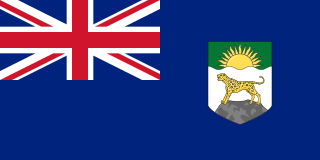
Nyasaland was a British protectorate located in Africa that was established in 1907 when the former British Central Africa Protectorate changed its name. Between 1953 and 1963, Nyasaland was part of the Federation of Rhodesia and Nyasaland. After the Federation was dissolved, Nyasaland became independent from Britain on 6 July 1964 and was renamed Malawi.

Hastings Kamuzu Banda was the prime minister and later president of Malawi from 1964 to 1994. In 1966, the country became a republic and he became president. His rule has been characterized as a "highly repressive autocracy."
Music of Malawi has historically been influenced through its triple cultural heritage of British, African, and American music. Malawians have long been travelers and migrant workers, and as a result, their music has spread across the African continent and blended with other music forms. One of the prime historical causes of the Malawian musical melting pot was World War II, when soldiers both brought music to distant lands and also brought them back. By the end of the war, guitar and banjo duos were the most popular type of dance bands. Both instruments were imported. Malawians working in the mines in South Africa and Mozambique also led to fusion and blending in music styles, giving rise to music styles like Kwela.
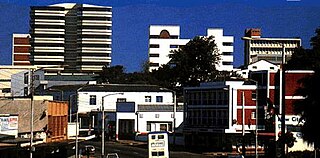
Blantyre is Malawi's centre of finance and commerce, and its second largest city, with an enumerated 800,264 inhabitants as of 2018. It is sometimes referred to as the commercial and industrial capital of Malawi as opposed to the political capital, Lilongwe. It is the capital of the country's Southern Region as well as the Blantyre District.

The Chilembwe uprising was a rebellion against British colonial rule in Nyasaland which took place in January 1915. It was led by John Chilembwe, an American-educated Baptist minister. Based around his Church in the village of Mbombwe in the south-east of the protectorate, the leaders of the revolt were mainly from an emerging black middle class. They were motivated by grievances against the colonial system including forced labour, racial discrimination, and new demands imposed on the indigenous population following the outbreak of World War I.
Blantyre is a district in the Southern Region of Malawi. The capital is Blantyre, a commercial city where most Malawian industrial and business offices are. The district covers an area of 2,012 km² and has a population of 809,397. It was named after Blantyre, the birth village of David Livingstone in Scotland, one of the first missionary explorers who came to Nyasaland, as Malawi was called before independence in 1964. It is also a main trading point besides the other large cities in Malawi. The other large cities are Lilongwe, which is located in the central region, and Mzuzu, which is in the northern part of Malawi.
Yatuta Chisiza was a Malawi minister of home affairs who led a brief guerrilla incursion into the country in October 1967.
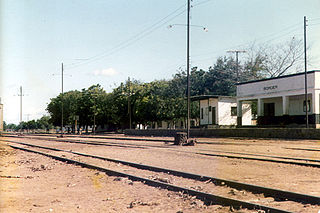
Malawi Railways was a government corporation that ran the national rail network of Malawi, Africa, until privatisation in 1999. With effect from 1 December 1999, the Central East African Railways consortium led by Railroad Development Corporation won the right to operate the network. This was the first rail privatisation in Africa which did not involve a parastatal operator.
Dunduzu Kaluli Chisiza (8 August 1930 – 2 September 1962), also known as Gladstone Chisiza, was an African nationalist who was active in the independence movements in Rhodesia and Nyasaland, respectively present-day Zimbabwe and Malawi.
Henry Masauko Blasius Chipembere was a Malawian nationalist politician who played a significant role in bringing independence from colonial rule to his native country, formerly known as Nyasaland. From an early age Chipembere was a strong believer in natural justice and, on his return in 1954 from university in South Africa, he joined his country's independence struggle as a nationalist strategist and spokesman. In 1957, considering that the independence movement need such a strong leader similar to Kwame Nkrumah, and considering himself too young for this task, he joined with other young nationalists in inviting Hastings Kamuzu Banda to return to Nyasaland as the movement's leader.
Rugby union in Mauritius is a minor but growing sport

The Nyasaland national rugby union team formerly represented Nyasaland, now Malawi, in the sport of rugby union.
The Daily Times is a daily newspaper published in Blantyre, Malawi. It is the oldest newspaper in the country, founded by the monthly Central African Planter in 1895. Around 1900, the title Central African Times was adopted, and weekly publication. Later the title was changed again, to Nyasaland Times. With Malawian independence in 1964, it became simply The Times, and finally the Daily Times in 1972.
St. Andrew's International School in Blantyre, Malawi was founded 1938 by the Church of Scotland Mission in Blantyre. The high school in its present form was established in 1958. SAIntS is a British International School offering (i) GCSE, A Level and BTEC qualifications and a wealth of extra-curricular opportunities.
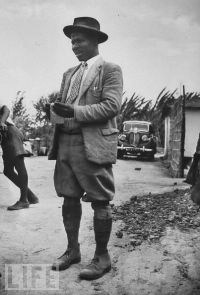
James Frederick Sangala was a founding member of the Nyasaland African Congress during the period of British colonial rule. Sangala was given the nickname "Pyagusi", which means "one who perseveres".
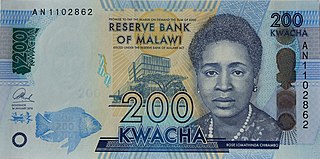
Rose Lomathinda Chibambo was a prominent politician in the British Protectorate of Nyasaland in the years leading up to independence as the state of Malawi in 1964, and immediately after.

The Malawian Defence Force is the state military organisation responsible for defending Malawi. It originated from elements of the British King's African Rifles, colonial units formed before independence in 1964.
LaurenceMakata, (1916–1962), was a businessman influential in the Nyasaland independence movement in the 1950s and 1960s.

Sena railway, also called Shire Highlands railway, Dondo-Malawi railway and North-South Malawi railway, is a railway that connects Dondo, Mozambique, to Chipata, in Zambia. It is c. 1000 km long, in a 1067 mm gauge.




















